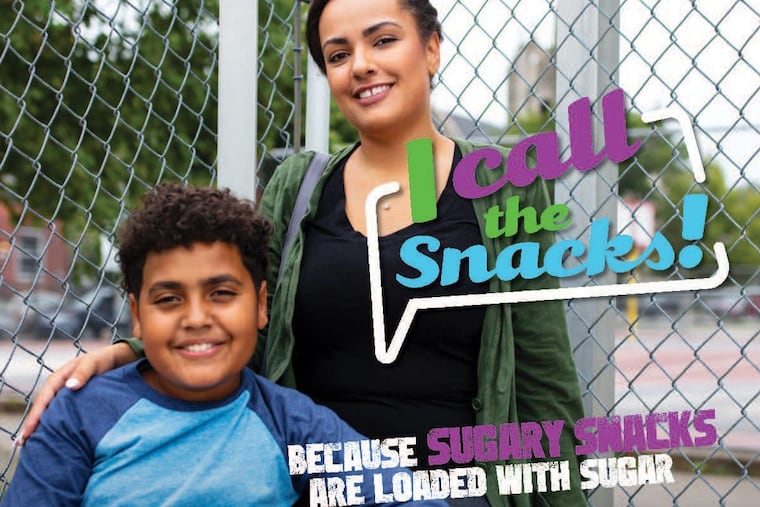Parents say Philadelphia’s hold-the-sugar campaign shames kids with Type 1 diabetes
Do Philly's anti-sugary-snacks ads tell enough? Some parents say no.

A new public service ad campaign intended to dissuade parents from giving their children sugary snacks has raised the ire of parents and advocates of children with type 1 diabetes.
The parents, whose children suffer from an autoimmune disorder, not sugary diets, say the ads are misleading because they don’t distinguish between the types of diabetes. They claim the ads, which can be seen online and on billboards, oversimplify a complex disease and are insensitive to some of its sufferers — “disease shaming,” one mother wrote and was echoed by others.
A petition on Change.org urging the city to take the billboards down had gotten more than 1,730 signatures of the 2,500 sought by early Tuesday evening. The petition also suggests that money used for the billboards go to buying insulin for people who can’t afford it or to educate people about diabetes.
In response to some of the concerns, the Philadelphia Public Health Department added some clarifying language to its campaign messages. On the FoodFitPhilly.org website, under one of the ads, there is now the line: “Prevent T2 Diabetes in Your Kids.” Fixing billboards, however, isn’t so simple.
James Garrow, a health department spokesperson, said efforts are being made to apologize for any hurt feelings, as well as to thank commenters for helping to clarify the difference between type 1 and type 2 diabetes.
However, Garrow said, “nearly every comment that we’ve received has been appreciative of the underlying goal of the campaign: to fight childhood obesity.”
Type 1 diabetes, less common than type 2, is an autoimmune disease in which the pancreas doesn’t make insulin or makes too little. It is often diagnosed in early childhood. Type 2 diabetes used to be very unusual in children, and for that reason was known as adult-onset diabetes. It often runs in families, and is a greater risk for people with obesity and poor nutritional habits — though it can strike slender people with healthy habits, too.
Both childhood obesity and diabetes are growing health problems in Philadelphia.
“We know that the number of cases of diabetes in Philadelphia is rising, and it’s already one of the top causes of death here,” Garrow said. In addition, 17% of Philadelphia children are overweight and 22% are obese, “which is a sign that they are already at risk for developing type 2 diabetes,” the spokesperson said.
City healthy officials announced the new campaign last week. It includes online and television ads, as well as billboards like those visible from the Walt Whitman Bridge. Their content includes messages like, “Today’s quick snack could be tomorrow’s diabetes,” with a child eating a doughnut.
As noticeable as those billboards may be, the internet’s reach extends even further. Twitter and Facebook pages for parents of children with type 1 diabetes from near and far were full of chatter about Philly’s ads. Some were clearly displeased.
“The condescending videos of moms telling the viewer that they choose the snacks to prevent their child from getting diabetes just about sends me into nuclear detonation mode,” wrote Carolyn Boardman whose Facebook page says she lives in Cypress, Texas.
Dava Waggener-Costello, a South Philadelphia mother of a child with type 1 diabetes, said she believes the campaign content is “shaming and blaming,” and the ads are not doing enough to educate about the different kinds of diabetes.
The billboards, she said, are “offensive and they’re just perpetuating misconception, and they need to come down.”
Debbie Healy, a Lehigh County resident and mother of a child with type 1, said she was pleased that Philadelphia officials added a reference to the difference between type 1 and type 2 diabetes, but she would like to see even more education and awareness about type 1 diabetes.
“Then compare and contrast the disease so people really understand the differences between these two diseases,” Healy wrote in an email. “This is how we will make real progress.”